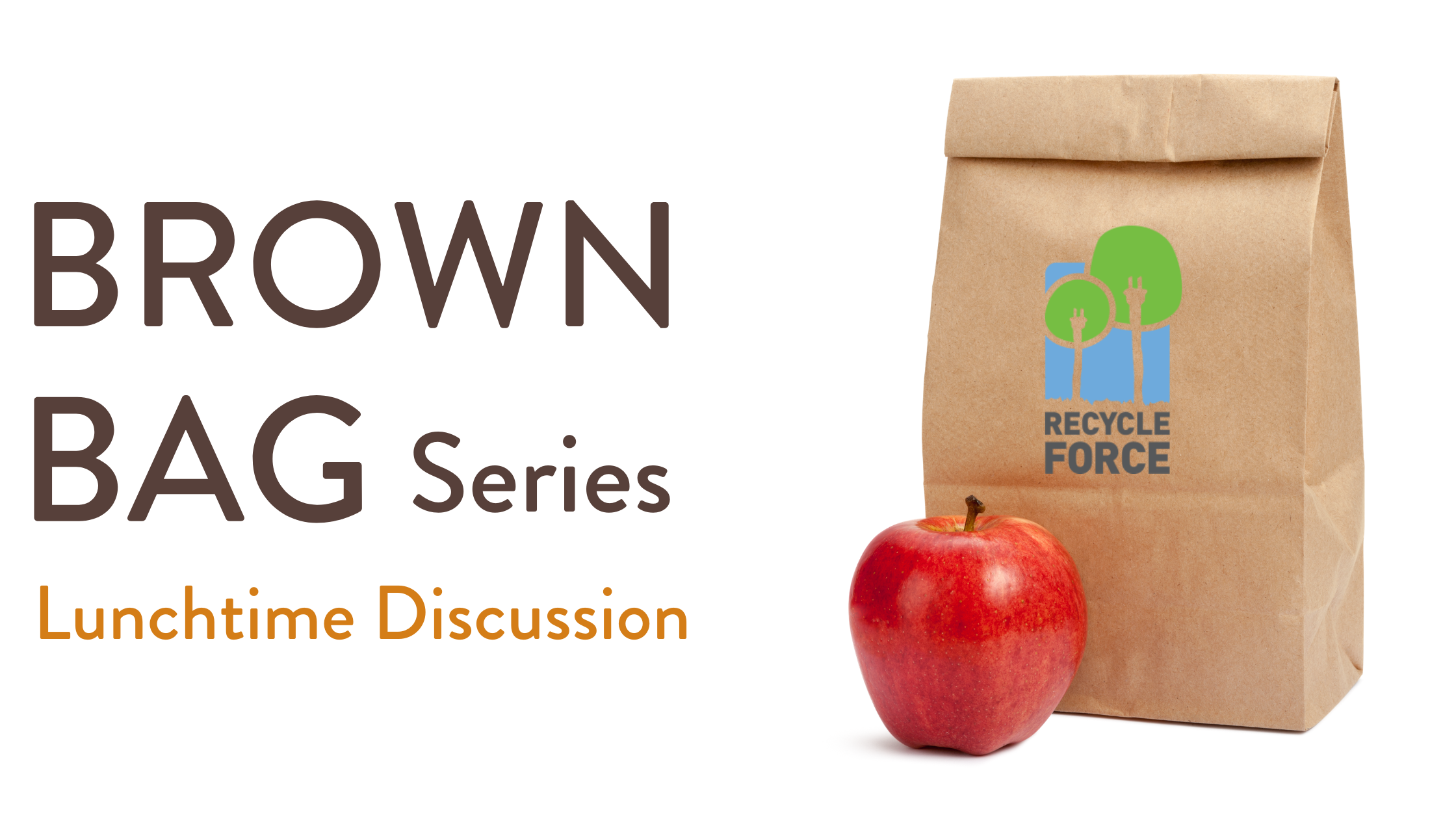RecycleForce hosted a virtual Brown Bag Session on Monday, November 16th about Employment Social Enterprises (ESE) and how they can help our communities heal from the impact COVID-19 is having on our state’s economy and our communities.
The three panelists (Kate Tromble, Gregg Keesling, and Leslie Wagner) along with moderator Cameron Carter discussed the positive impact transitional jobs programs have on families, public safety, and the economic health of communities.
Meet Our Panelists
Leslie Wagner leads clients through the location modeling, site selection, and incentive procurement process. Her work includes managing new facility development, expansion, consolidation, and relocation of Fortune 500, life sciences, manufacturing, distribution, and information technology clients. Her expertise in negotiating and coordinating initiatives with economic development organizations, while synchronizing activities with government agencies provides a significant advantage to Ginovus clients throughout North America.
Kate Tromble is Vice President for Federal Policy at Results for America. She previously served as the pastoral associate for social justice at Holy Trinity Catholic Church in Washington, D.C. Prior to joining the Holy Trinity Staff, Kate served as Director of Legislative Affairs at the Education Trust, a nonprofit policy and advocacy organization that seeks to eliminate the academic achievement gaps that separate low-income students and students of color from their peers. Before Education Trust, Kate practiced law at Drinker Biddle & Reath LLP and Williams & Connolly.
Gregg Keesling is the President and founder of RecycleForce, an employment social enterprise based in Indianapolis, Indiana. Gregg has led RecycleForce for over 15 years and has developed a unique social enterprise that has provided thousands of formerly incarcerated men and women with workplace training, certifications, counseling, and meaningful employment.
Cameron Carter (moderator) is the founder and CEO of Content by Carter. A trusted advisor to senior leadership in both the public and private sectors, Cam understands the importance of consistent, spot-on messaging that supports strategic business objectives. A lobbyist, he has 25+ years of experience in business, economic development, marketing and public affairs.
Career Pathways
The Brown Bag Session was kicked off with Kate discussing subsidized employment. “What we’re really talking about here is career pathways. It’s a career pathway for folks who have barriers to employment.”
RecycleForce’s ABC jobs model of any job, a better job, and a career is a career pathway for formerly incarcerated or homeless individuals who don’t have a work history or haven’t been able to hold a job. These ABC programs often work best during an economic downturn, which is why right now is a prime time to be discussing career pathways.
How does the ABC job model work? The “A” step is any job, a transitional job. This is what RecycleForce does by not only providing a job but by helping these individuals stabilize their life through housing, emotional support, etc. After 180 days, it is then time for the next phase: a better job.
The individual leaves the transitional job experience, and is ready for a better job. At this time, they don’t need as many supports, but are not yet ready for a career. This is where federal, state, or local dollars can come in and pay for 50% of the employee’s wage, which takes some of the risk off of hiring that person and gives an employer a sort of insurance around hiring them. Subsidized jobs should then continue on for 18 months at the most, then they’re ready to be a quality employee for a long-term employer.
This is where we enter the “C” step: a career. The employee is valuable to the employer and has the skills/training necessary to be a long-term asset to the team.
These individuals will be coming back to the community when they come out of prison, and these ABC programs are here to make them better community members. Employees are making more and contributing more to their communities. Research has shown that it works. You can find the Department of Labor’s Enhanced Transitional Jobs Demonstration Benefit Cost Brief results here. Recidivism goes down, and wages go up – and in the case of RecycleForce we’re also benefiting the environment.
Recycling Lives
“We recycle old electronics and a large amount of metals, but we also recycle lives, recycling men and women back into society so they can be productive citizens and productive parents,” said Keesling. “We’re not just a social enterprise, but we’re an employment social enterprise. We help stabilize them on their oversight.”
In Marion County on any day, there are over 15,000 people on criminal oversight. This includes reporting to probation officers and random drug testing. At RecycleForce, we can adhere to oversight while still giving formerly incarcerated individuals a chance to work. This makes RecycleForce the “any job” step in the ABC model. “We feel there is a great need to expand the RecycleForce model across the state. The timing is right to begin to think about how we expand and use our work as an economic tool.”
“The leading driver of location decisions is the availability for labor,” said Wagner. With e-commerce growing rapidly, the greatest need for types of positions are customer service reps, shipping and receiving, and order fillers. The ABC program is a win-win for everyone involved to be able to provide employees for this work.
Subsidized Employment
The vast majority of people that come through RecycleForce want to work and can work. RecycleForce is a place where they can earn and learn while managing the oversight placed on them. These transitional jobs lead to a career and stable employment. The initial subsidy is lessened because we’re also generating tax revenue.
“In a wage-paying transitional job, there are taxes paid,” said Keesling. “We’re turning those dollars back in to tax revenue for the state and local government. We’re paying a wage for real work, even though we’re designing that work to make people able to better themselves. We’re paying for them to earn credentials. This is something for our legislators to think about. Wage-paying employment does turn some of those dollars back into the local economy.”
“There are many companies embracing hiring ex-offenders,” said Wagner. “We’d like to see more companies in Indiana getting behind it as well.”


